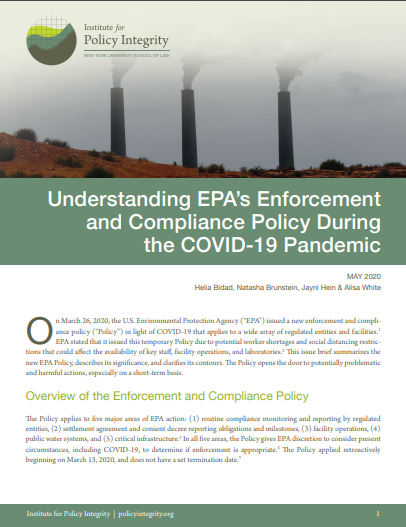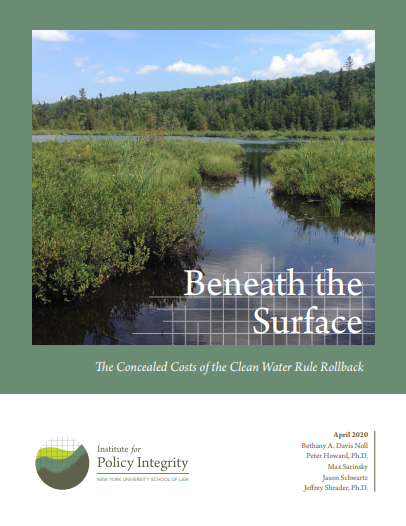-
Understanding EPA’s Enforcement and Compliance Policy During the COVID-19 Pandemic
This issue brief summarizes EPA's enforcement and compliance policy in light of COVID-19, describing its significance and clarifying its contours. The policy opens the door to potentially problematic and harmful actions, especially on a short-term basis.
-
Joint Comments to CFTC on Climate-Related Market Risk
The Commodity Futures Trading Commission (CFTC) requested public input on issues relevant to its Climate-Related Market Risk Subcommittee. We submitted joint comments highlighting the significant financial risks that climate change poses and emphasizing that an economy-wide price on carbon emissions is the regulatory tool that will be the most effective in mitigating a climate-related financial crisis.
-
Comments to PHMSA on Data Collection from Pipeline Accidents
The Pipeline and Hazardous Materials Safety Administration (PHMSA) is proposing to gather additional data on pipeline accidents and fires, including data on injuries, property damage, and loss of natural gas. We submitted comments supporting PHMSA’s efforts to better assess the social cost of accidents and encouraging the agency to estimate greenhouse gas emissions that result from pipeline fires.
-
Comments to SEC on Regulation S-K and Climate Risk
The Securities and Exchange Commission (SEC) proposed a rule modifying Regulation S-K, which governs reporting requirements for public companies. We submitted comments focusing on the SEC’s failure to require disclosure of risks relating to climate change. Climate risks are economy-wide impacts in which the future increasingly diverges from past experience, and predicting such risks requires more granular data than is typically disclosed in financial reporting. We suggest that the SEC adopt a more specific line-item approach to climate risk reporting, similar to the framework suggested under the Task Force on Climate-Related Financial Disclosures.
-
Fourth Circuit Amicus Briefs on Title X Rule
Last year, the Trump administration finalized its Title X “gag rule,” which prohibits funded family planning service providers from referring clients for abortion and requires Title X facilities to be physically separate from facilities that provide abortion. We’ve filed two briefs in the U.S. Court of Appeals for the Fourth Circuit in the ongoing challenge of the rule.
-
Beneath the Surface
The Concealed Costs of the Clean Water Rule Rollback
In restricting the scope of the Clean Water Act through two regulatory rollbacks, the Environmental Protection Agency and Army Corps of Engineers claim that the estimated compliance-cost savings exceed the environmental harms (in the form of forgone benefits). Yet these analyses suffer from severe methodological flaws. And correcting the analyses would very likely show that the rollbacks are net costly to society, depriving the public of potentially billions of dollars in annual forgone benefits. As detailed in this report, the agencies’ failure to meaningfully assess the substantial harms that will result from their rollbacks violates both regulatory precedent and the agencies’ legal obligations.
-
New Resource Tracking Reduced Enforcement of Environmental Laws in Response to COVID-19
The Institute for Policy Integrity is tracking altered enforcement of environmental laws by federal and state agencies in response to the COVID-19 pandemic. In connection with the crisis, several agencies have issued waivers or announced plans to stop enforcing key environmental laws and regulations.
-
Amicus Brief on EPA’s Clean Power Plan Replacement Rule
Last year, the Environmental Protection Agency (EPA) replaced the Obama Administration’s Clean Power Plan, which sought substantial cuts in greenhouse gas emissions from power plants, with the so-called Affordable Clean Energy (ACE) rule, a far weaker policy that will, at best, yield modest reductions below business-as-usual emissions and, at worst, increase pollution from the electric sector. We filed an amicus brief in the U.S. Court of Appeals for the D.C. Circuit highlighting three key errors in EPA’s rationale for repealing the Clean Power Plan. Specifically, we explain, EPA misstates regulatory precedent and Clean Air Act legislative history supporting the Clean Power Plan and disregards the substantial harms that the ACE Rule will cause.
-
Comments to EPA on Coal Combustion Residuals Rule
Coal combustion residuals, commonly known as coal ash, are the residual substances that remain after burning coal. They contain several chemicals that are toxic to human health, including arsenic, boron, lead, and mercury. The Environmental Protection Agency (EPA) proposed a rule that amends the regulatory framework for the disposal of coal ash. We submitted comments in January detailing how EPA fails to analyze the forgone benefits of the regulatory changes, which extend deadlines and eligibility for facilities that lack appropriate disposal capacity. We also submitted comments in April focusing on the second part of EPA's proposal, which fails to assess the forgone benefits of allowing facilities to seek approval for alternative basin liners.
-
Key Economic Errors in the Clean Car Standards Rollback
The federal Clean Car Standards promised steadily increasing fuel efficiency and lower vehicle emissions. The National Highway Traffic Safety Administration and the Environmental Protection Agency have now rolled back those standards, eviscerating important public health benefits and fuel savings for consumers. But the agencies’ own analysis shows that the rollback will cause more harm than good for society. And even the slight benefits that the agencies find under certain assumptions are premised on a flawed economic analysis that is riddled with problems.
We released a resource that explains the main economic problems with the rollback’s justification, identifying several critical errors and detailing how they invalidate the agencies' own claims
Viewing recent projects in Consumer and Healthcare Protection









